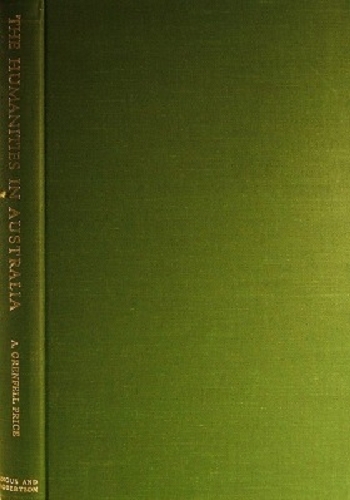A. Grenfell Price, The Humanities in Australia: A Survey with Special Reference to the Universities (1959)
Archibald Grenfell Price was one of Australia’s most prolific academics. A long serving Master of St Mark’s College at the University of Adelaide (1925-56), he was ostensibly a geographer, but he also wrote numerous histories related to both Australia and the broader Pacific, and even some economics.
Indeed, perhaps his most influential work was a booklet on how to solve Australia’s economic problems during the Great Depression, which sold 30,000 copies in just a few weeks. An exponent of economic orthodoxy, insistent that Australia pay back its debts and live within its means, Price was so concerned about the economic experiments advocated by some radical members of the Labor Party that he came to play a very important political role.
When Joseph Lyons split from the Labor Party and brought a handful of MPs (including some South Australians) with him, Price became active in organising a unity ticket that would help all those committed to economic stability to win seats at the 1931 federal election, regardless of their previous political affiliations. Since he was not a member of any political party, Price was perfectly suited to acting as a moderator between the various groups, and the ‘Emergency Committee’ he headed proved so successful that it won all but one South Australian seat at the poll.
Menzies had likewise been involved in the organising processes which produced the United Australia Party’s landslide election victory, and the two became close friends. They held overlapping views, not just on economics, but on the importance of the study of humanities for the health of society. The Menzies Collection contains four separate copies of The Humanities in Australia, a testament to how much he believed in the book’s core premise. Which was that a society not interested in its past, is likely to have no future to be interested in.
It’s no surprise that Menzies agreed with this sentiment. After all, he wrote the book’s foreword, which offers a great insight into Menzies’s views on the subject soon after he had made the huge investment into Australia’s university system that was adopting the proposals of the Murray Review into Higher Education:
‘We live dangerously in the world of ideas just as we do in the world of international conflict.
To-day the popular accent is on the physical sciences, the fullest development of which is essential to the improvement of the world’s material standards; of public and private health; of increased production; of transport and communications. This is good. Indeed, it must go on more and more rapidly if the expanding populations of the world are to be fed and clothed and housed, set free from poverty and pestilence and misery, and so permitted to enjoy access to the higher world of intellectual creation and reflection.
But there is a danger in concentrating our faculties too much into one channel. The troubled history of the 20th century affords sad proof of the fact that humanity can be overthrown by mechanical skill and the worship of the purely material.
Only in the last few weeks we have had dreadful examples of murder and violence used as a political instrument; publicly admitted; made an occasion for well advertised boasting.
If we are to make our escape from this modern barbarism, humane studies must come back into their own; not as the enemies of science, but as its guides and philosophic friends.
Perhaps the most significant sentence in Francis Bacon’s immortal essay on Studies is in Latin, Abeunt studia in mores. For, beyond question, what a man reads, and how he thinks, will serve to fashion his personality.
Specialisation will add enormously to a man’s knowledge in his own field. But his service to mankind will be the greater if his interests are broad, so broad that there is no aspect of human life which lacks interest for him.
Homo sum; humani nil a me alienum puto. Physics and metaphysics are, so regarded, aspects of the same universal problem. Today, the physical science are receiving a great deal of public attention, even though private attention to them may be comparatively restricted. They are, so we say, practical. And so they are, practical and vastly important. The trouble is that, with our quaint instinct for dichotomy, we tend to divide studies into the practical and the useless. Chemistry is practical; the classics, and history, and literature, are “useless” in the sense that they are ornaments but (so it is said) have no structural significance.
This kind of reasoning is not only fallacious, but dangerous. On one level it is leading to the substitution of jargon for good speech or writing. On another it is encouraging the idea that history, which tends to produce a sense of proportion; and languages, which tend to produce a precise understanding of words and meanings; and philosophy, which tends to explain the sources and nature of ideas and emotions; are irrelevant to practical life.
If we are to advance in civilisation, we must bring all these things into perspective. For if the challenge to civilisation, the greatest challenge of our time, is to be met, it is necessary to see that the main source of that challenge is not external but internal. Wisdom, a sense of proportion, sanity of judgment, a faith in the capacity of man to rise to higher mental and spiritual levels; these are the ends to be served by the Humanities Council, whose “Survey” I am honoured to introduce.’
You might also like...
Sign up to our newsletter
Sign up for our monthly newsletter to hear the latest news and receive information about upcoming events.


